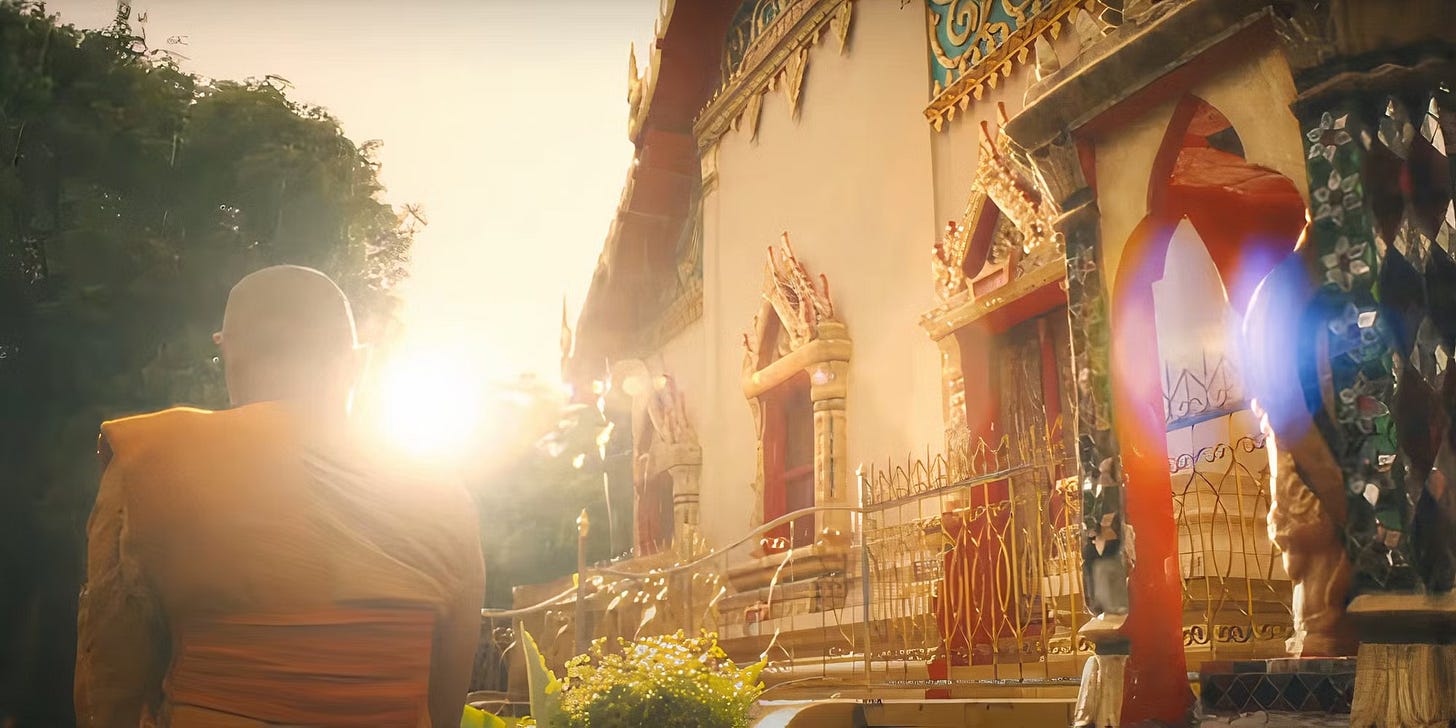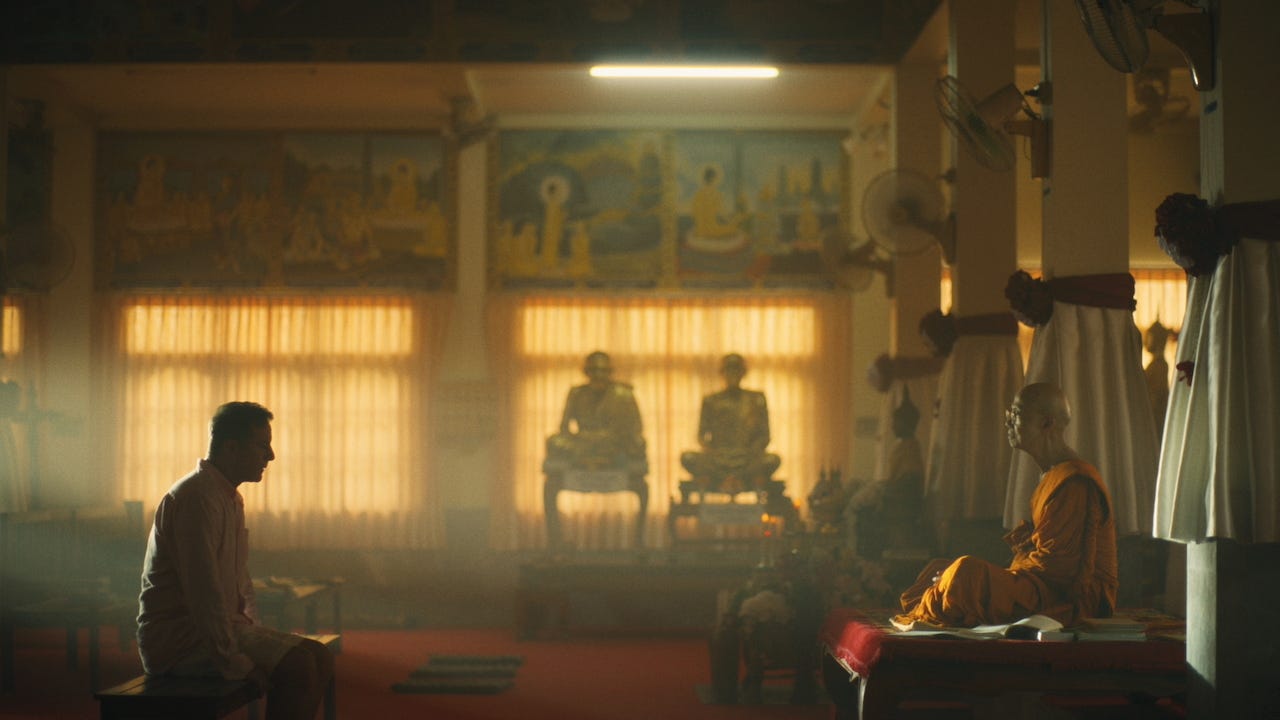brave enough is a newsletter about finding balance between technology, nature and modern life. Join the club ❤️🔥
Spiritual malaise. This phrase – mentioned in a powerful scene in the latest season of The White Lotus – struck me like a bolt of lightning. It marinated in me for weeks, crystallising my thoughts on a puzzle that has bugged me for a while now: meaningful work.
While I wouldn’t say I am a workaholic, that word has been used to describe me before. Since I was sixteen, I haven’t not had a job. Like every 30-something, I grew up in a world that taught me a career would be what gives me freedom, purpose and security. I believed this story without question. Since I was young, I have taken great joy in work. I was the bookworm who asked for extra paper during exams. I’ve burned the midnight oil in start-ups, working until 10pm, 11pm, after midnight – then getting up at 7am to get to the office early and crack out yet more work before my meetings start. For a while, it felt fulfilling, at times addictive.
I have always believed that how one spends 8+ hours of their life, most days of the week, is an extremely interesting fact about a person, if not representative of their definitive traits. Side note – this is not a cool opinion to have Berlin, where a large portion of people live hedonistic, alternative lifestyles. A few summers ago, I was talking to a girl at a party, who told me with an eye roll: “Don’t you think it’s so lame when people ask you what you do for a living?” She blew out a plume of cigarette smoke. “I mean, why would someone even want to know that?” I disagreed hard. My mind jumped to images of single moms who work two jobs to feed their children. I thought of friends who consistently seek out positions and companies that have tangible social impact. I thought of people who only choose a job based on which pays more commission. There is no right and wrong, just personal choice, but your work says a lot about you and your priorities in life.
I always disliked the dichotomy of the expression you either live to work or work to live. It always felt too simplistic to me. I’ve always felt somewhere in the middle – my work an important pillar of my life, but never the only thing. Regrettably, there have been moments in my career where I slipped closer to the live to work end of the spectrum. But now, fifteen years or so into my career, I find myself at a crossroads. It’s not that I don’t enjoy my work anymore – I really do – but as I stare down the barrel at the next few decades, I realise that there is something missing. Spiritual malaise. The rising pay checks, the promotions, the new job titles – it doesn’t feel as exhilarating as it once did.
What caused the illusion to shatter? It’s hard to pinpoint just one thing. Rather, it’s a muddle of personal experiences combined with the macroeconomic situation looming over us all. I’ve finally reached a point where the weight of what I have seen and heard over the last decade and a half caused a tectonic shift in my thinking. As one of my favourite Substack writers, Rosie Spinks, pointed out in a recent essay: ‘Almost everyone I know is worried about work: finding a job, keeping the one they have, or what will happen when the work they do no longer exists.’ Getting a degree from a top university, forging a career, a consecutive string of promotions – once stamps of guaranteed success in life – are no longer the shields they once were. The economy is in the toilet, tech feudalism is rampant, and our social structures continuously downgrade themselves in ways that make fulfilling our basic human needs – getting enough sleep, exercising, raising children – frighteningly difficult. Spiritual malaise. In the tech industry, people use the phrase “burned out” very loosely, but I have seen real burnout – even teetered on the edge of it myself – and it’s not pretty. Burnout is not the same as “being tired”. I have worked with people who seemed like they would never run out of gas – but then one morning the burnout strikes, and they physically cannot get out of bed. It is scary. Friends who’ve blazed through the last decade in Big Four consultancies have a dead look in their eyes when they talk about their jobs. Colleagues who desire to have children are obsessed with answering the impossible question of when they can possibly afford to do it. Lucy Jones’ pioneering book Matrescence points out just how laughably worse things have become, despite all of our perceived “progress”: ‘Mothers spend twice as much time looking after their children every day compared with the 1960s, while also working more. Men today do about twice as much care work as women did fifty years ago.’
I’m not here to tell you that work isn’t important. It is very important, if even for the fact that we are living within the constraints of late-stage capitalism, and unless you’ve got wealth on your side, you have to grind it out just like everyone else. However, I would issue a word of caution to anyone who feels like giving everything they have in the tank to their job is the right thing to do.
The most important lesson I have learned about work is that no company is going to save you. This isn’t a reflection of any employer, but simply the market – which prevails every time. I have been fortunate enough to work at some amazing companies, but that doesn’t change the fact that we are collectively reaching the upper limits of a system that is obsessed with growth at all costs. This pressure-cooker environment has made us feel like if we just work hard enough and long enough, that we will be saved. It is folly.
This is a truly terrifying realisation when thoughts of a meaningful career have formed the blueprint for what you thought would fulfil you. It made me feel like one of those animals you hear about before a natural disaster, becoming more agitated and erratic as the wave rolls towards the shore. The void I felt shook me to my core. How could I possibly move forward feeling so untethered?
One of the most helpful antidotes to my terror was yet another essay by Rosie Spinks, about what she refers to as the collapse: ‘It’s a nagging sense that has hung over modern life since 2020, or 2016, or 2008, or 2001 — pick your start date — that things are not working anymore. And that waiting for them to get better after the next Most Important Election of Our Lives, or another war to end, or a new economic recovery cycle doesn’t seem to be having the desired effects.’ In short, once you accept the hard truth that building a career and earning money is not the everlasting source of happiness and meaning you believed it would be, you can start to look outside the box you built for yourself.
Long before fat salaries existed, it was social capital and trust economies that got many people through life. A few examples include informal banking systems, where community members pooled money and took turns using the lump sum. In rural North America in the 18th and 19th centuries, barn raising was a practice where neighbours gathered to help build a barn for one family, knowing the favour would be returned. Most societies took for granted that children should be raised collectively, and provided new mothers a plethora of support (this is still the case in many existing societies outside of the West). One of the most important lessons we can learn from our ancestors is that it was rarely work that saved us, but other people. Crucially, we need to remember that everyone has the power to forge these meaningful social networks.
Amongst all of this chaos, we also have to somehow find moments to enjoy our time on earth. This is where creative work kicks in, for what is creativity but a re-expression of how life has made you feel? Humans have been expressing themselves creatively since we lived in caves, and even the most powerful AI breakthrough won’t quell this urge. I feel disheartened that so many people in my life are disconnected from creativity and their childlike wonder about the world. Whenever someone tells me that they are not creative, I tell them they are wrong. This is because they believe they need to be really good at drawing or making music or writing in order to do it, because we have internalised the belief that things that cannot be monetised have zero value.
I now see work not as a spectrum where you are either dedicated to your career or not, but a Venn diagram that encapsulates different kinds of work: paid work, social/community work and creative work. This, I believe, is what can lead us towards fulfilment and away from spiritual malaise – even within the confines of capitalism.
With this is mind, I’ve written five guidelines about meaningful work which I wanted to share:
The old analogy about work being a rubber ball is 100% true. The glass balls – your health, your relationships, your spirit – need to be protected.
Never allow your job to severely impact your health. A late night here and there won’t kill you, but consecutive years of sitting at a desk until the early hours of the morning very well might.
Don’t mistake achievements for fulfilment. They’re not always the same.
Your career can be a source of pride, but you should make sure that there is substance to who you are if it ever got taken away.
Actively build your safety net beyond your job – in your community, your creativity, and your sense of purpose.
As always, thank you for reading. If you enjoyed this essay, please share my work – it really helps me to reach new audiences. I appreciate your support ❤️











It's always such a pleasure to read your essays; this was particularly interesting! I loved the Berlin insight on this too XD I did meet someone who insisted on asking 'what do you do for living, not for working. What do you do outside those 8 hours' and I just started my first job and didn't know what to answer. Now, I know why I still work in the same place, and I would love to go back in time and explain how my higher sense of purpose spills into community and status work, working in healthcare/government based organisation is fulfilling as much as my creative time.
this was excellent, thank you